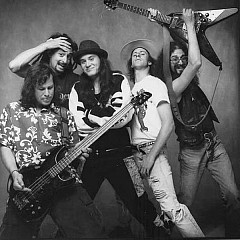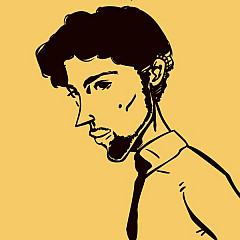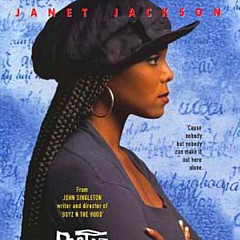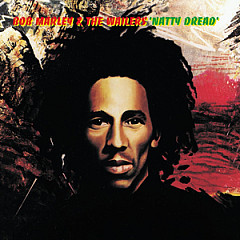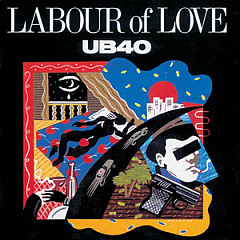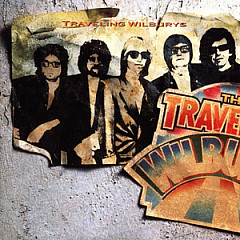Blackfoot got a makeover in 2012 when Rickey rebooted the band with a whole new lineup: vocalist/lead guitarist Tim Rossi, vocalist/guitarist Rick Krasowski, bassist Brian Carpenter, and drummer Matt Anastasi. Rickey no longer tours with the band, but works behind the scenes as a writer and producer. Their latest album, Southern Native, is expected in August 2016.
 Greg Prato (Songfacts): How does songwriting in a band nowadays compare to the '70s and '80s?
Greg Prato (Songfacts): How does songwriting in a band nowadays compare to the '70s and '80s?Rickey Medlocke: Back in the day, you had a couple of guys - three at the most - that collaborated. And they pretty much collaborated all the time together. Today, there are a lot of songwriters out there. You'll see - which I happen to not necessarily agree with - more than three guys on a song, which I think brings in too many different views on the song that you're going after.
I've seen songs written nowadays by five or six guys, and that's a lot of input into a song, trying to hone it down into a certain direction and lyrical content. Back in the day, with Lynyrd Skynyrd and Blackfoot, there were only a couple guys within the band who wrote songs. You knew the direction that you were going after, you knew the direction of the group. And I believe from the music right through the lyrical content, it was all in one direction.
Rickey returned to Blackfoot and Skynyrd tried again with Al Kooper producing at a studio in Georgia. These sessions resulted in their first album, Pronounced Leh-nerd Skin-nerd, released in 1973. In 1977 a plane crash killed lead singer Ronnie Van Zant and left other members badly injured. The following year, unreleased songs the band recorded in Muscle Shoals were released on an album called Skynyrd's First and... Last. Two of the tracks are songs Rickey wrote: "White Dove" and "The Seasons."
Rickey: Actually, the inspiration for both of them was I was a big Neil Young fan at the time. I used to love his records, and Neil Young was the inspiration for both those songs. When I came to the band, I played them for Ronnie [Van Zant], Gary [Rossington], and Allen [Collins], and they loved them. When we went to record in Muscle Shoals, they suggested that we do the tunes, and there you go - that was the history of it.
Shorty's compositions appeared on several Blackfoot albums, including "Railroad Man" (which he sang on) and their Top 40 hit "Train, Train" (which he played harmonica on). He also co-wrote the songs "Fox Chase" and "Rattlesnake Rock n' Roller" (the latter of which he played banjo on). Shorty passed away in 1982. [Check out an interview with Blackfoot and Shorty from 1981 here].
Rickey: Absolutely, he was. The first time I was in the band, Ronnie, Gary, and Allen used to come over and hang out at my parents' home, and my dad used to play the blues for us. When you hear the line, "He used to own an old dobro, used to play it across his knee," that is very true - that's the way my old man did it. Ronnie took his inspiration from the blues, and thinking of my old man. There you go - that's the way it came out.
Songfacts: In "Train, Train," the girl goes to Memphis, but where does the guy go?
Songfacts: What was the inspiration behind "Highway Song"?
Rickey: The original guys in Blackfoot, we were going from North Carolina up to Jersey, to play a series of shows. Jakson [Spires] and I wrote pretty much all the material for Blackfoot. I was in the back of the van that we were riding in, and I had the music to it. We were on Interstate 81 going north, and we were right around Winchester, Virginia, and I started playing it. I wrote the opening of the lyrics, "Another day another dollar, after I've sang and hollered," and it took off from there.
Songfacts: "Diary of a Working Man"?
Rickey: I had been watching a movie of a guy that was just so down on his luck. It was on late one night at about 2:00 or 3:00 in the morning, and at the end, the guy is beyond despair - his wife had left him, took his kids, had no money. The same old storyline that's true with a lot of people. And at the end of the movie, it was kind of like a really weird twist: you see the guy, and he's very angry, and all of a sudden, it shows this anger in his face, and the screen goes dark. You go, "Wow. They left us hanging." And then a gunshot rings out. And you really don't know if the guy actually shot himself or not. So that's the way we did the song - you really don't know at the end if he did it or not.
Songfacts: Would you happen to recall the name of that movie?
Rickey: You know what brother, I really don't.
Songfacts: What about the title track for Southern Native?
Rickey: That took on a whole different thing about writing about a southern native. It's kind of a self-explanatory thing within myself, because I live down near the swamps, down near the Everglades here in Florida.
My dad was a Native American, and my mom a little bit of Native American, but basically from the south. I collaborated on that song to give it a vibe of the south without overstating and overdoing it. You go to writing about maybe a certain place in the country or a certain ethnic thing of people there, and you can kind of overdo it. You can go too far. But I believe that the lyrical content is right on point, and I was happy the way it came out.
Songfacts: Before, you mentioned being a fan of Neil Young's music. Who are some of your other favorite songwriters?
 Rickey: Of course, the combination of Lennon and McCartney - brilliant. Those guys, what can you say?
Rickey: Of course, the combination of Lennon and McCartney - brilliant. Those guys, what can you say?Ronnie, even when I played with him, a brilliant lyricist. He made you feel you were right there. It was almost like an artist with an easel, painting a picture. I just thought he was a very unsung southern poet. Great songwriter.
Bob Seger. Talk about a guy who could paint a picture with lyrics - he was one of them.
Another one of my favorites was the combination of Elton John and Bernie Taupin. Elton John could come up with all the music, but my God, Bernie Taupin came up with just brilliant lyrics.
Songfacts: Do you recall who some of Ronnie's favorite songwriters were?
Rickey: He loved Neil Young. I know there has been a lot of controversy about Neil Young and Ronnie having some kind of tiff [again, "Sweet Home Alabama"], but they really didn't. I remember Ronnie used to love a lot of blues musicians, like Son House, Robert Johnson, and people like that. Muddy Waters. He also used to love - only because his dad was a truck driver - Merle Haggard and people like that. He was a guy that took inspiration from everyday life. What you hear, he lived it, and that's one thing that I admired so much about him: he lived what he wrote about.
July 14, 2016.
For more Blackfoot, visit blackfootband.com, and for more Skynyrd, visit lynyrdskynyrd.com.
More Songwriter Interviews

